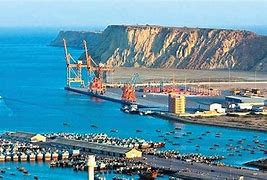Pakistan prepares ahead of Premier Li Qiang’s Visit as it works on potential agreements to be made under CPEC. It is optimistic about securing new deals during the anticipated visit of Chinese Prime Minister Li Qiang.
The exact number of agreements and memoranda of understanding (MoUs) that Pakistan aims to finalize during Li Qiang’s visit is still undecided. The Ministry of Foreign Affairs has provided a preliminary list of about 41 potential agreements for the occasion.
Planning Minister Ahsan Iqbal confirmed that discussions on the list of potential deliverables for the visit are ongoing. He made this comment in response to a media query.
A day earlier, Iqbal expressed dissatisfaction with the Foreign Ministry’s move to finalize CPEC-related deliverables for the Chinese Prime Minister’s visit without consulting him. In response, Iqbal convened a meeting with relevant ministries and confronted the Foreign Ministry representative. Tariq Fatemi, the Special Assistant to the Prime Minister, supported Iqbal’s stance.
This visit will mark the first by a Chinese prime minister to Pakistan in 11 years. Li Qiang’s arrival is scheduled just ahead of the Shanghai Cooperation Organization (SCO) Summit set for mid-October.
In Phase I of CPEC, 38 projects worth $25.2 billion were completed. Currently, 26 projects valued at $26.8 billion are underway, many of which are included in CPEC’s second phase.
Pakistan has suggested around 41 deliverables for the visit, with about 17 of them being at an advanced stage. These agreements could be finalized if China agrees.
Key agreements in discussion include a cooperation plan aligning CPEC with China’s Belt and Road Initiative, finalizing financial arrangements for the Kohala, Azad Pattan, and Gwadar coal power projects, and offshore oil and gas exploration blocks for Chinese firms.
Other proposals include revising an agreement to avoid double taxation, signing agreements for the construction of breakwaters at Gwadar port, and finalizing details on various infrastructure projects. However, China has shown reluctance to sign an MoU on coastal tourism in Gwadar.
Pakistan has also proposed a sister port agreement between Karachi and Shanghai, along with the inauguration and transfer of New Gwadar International Airport. They also seek a financing agreement for the first phase of the Mainline-I railway project between Karachi and Hyderabad, though Pakistan has yet to share the draft agreement with China.
Pakistan hopes to secure a loan agreement for the $2 billion Thakot-Raikot section of the Karakoram Highway, with China currently reviewing the draft. A breakthrough on this is expected during Li Qiang’s visit.
A currency swap agreement may be signed, as both China’s People’s Bank and Pakistan’s State Bank have already agreed on the draft, marking a significant achievement of the visit.
Pakistan has also proposed signing a protocol on quarantine requirements for exporting donkey meat to China, with a high chance of success since the draft is already agreed upon. Additionally, an agreement on co-producing television programs is expected.
There is also a possibility that the countries will sign the minutes from the 13th Joint Cooperation Committee meeting of CPEC held in May. Pakistan also aims to finalize the minutes from the 11th joint working group on transport infrastructure and the 7th joint working group on Gwadar.
Among the likely agreements are certificates for smart classrooms at 100 Pakistani universities and digitization of the terrestrial network. Other key deals include a China-Pakistan education exchange plan and cultural agreements between both nations.
Pakistan has prioritized completing four major road projects: DI Khan-Zhob, Mirpur-Muzaffarabad-Mansehra, Karachi-Hyderabad Motorway, and the Babusar Top tunnel. Technical working groups to finalize feasibility studies may also be formed during the visit.
While Pakistan has proposed a loan agreement for a Pakistan Space Center, it is unlikely to be finalized. Similarly, a framework agreement for Phase II of the Eastbay Expressway has been suggested.
Pakistan is aiming to sign at least 18 MoUs, which will include collaboration on laboratories, IT cooperation, flood control, technical training for hydropower projects, and joint studies on Thar Coal development and hydropower site identification.
Other proposed agreements include collaboration on artificial intelligence projects, joint studies on mining non-ferrous metals, and a MoU between COMSATS University and Nanjing University of Science and Technology.
Related Posts

















